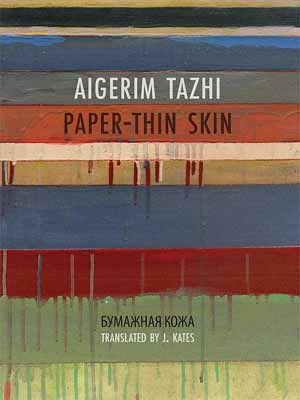Paper-Thin Skin by Aigerim Tazhi, translated from Russian by J. Kates / Zephyr Press / 978-1-938890901 / 2019
 Aigerim Tazhi is a difficult poet to pin down. For one, she writes in Russian in Kazakhstan, a country that’s (with its recent decision to Latinize its script) working to break away from Russia’s cultural influence. In an interview with Philip Metres, Tazhi explains the Kazakhstan of her birth was not an independent country but firmly part of Soviet Russia. “We had a common country then, a common capital (Moscow), and the main language was Russian,” says Tazhi. “I did not choose Russian language, and I did not evaluate it in terms of its attractiveness. It’s just the language that I’ve spoken since childhood.”
Aigerim Tazhi is a difficult poet to pin down. For one, she writes in Russian in Kazakhstan, a country that’s (with its recent decision to Latinize its script) working to break away from Russia’s cultural influence. In an interview with Philip Metres, Tazhi explains the Kazakhstan of her birth was not an independent country but firmly part of Soviet Russia. “We had a common country then, a common capital (Moscow), and the main language was Russian,” says Tazhi. “I did not choose Russian language, and I did not evaluate it in terms of its attractiveness. It’s just the language that I’ve spoken since childhood.”
As Olga Borisovna Markova notes in translator J. Kates’s introduction to Paper-Thin Skin, the dissolution of the Soviet Union created a kind of diaspora of Russian language writers who now live in an involuntary exile. Bound to a Russian literary tradition, they were left to forge something new using old tools. Markova concludes: “Free of politicized Russian society and not free from the influence of a variety of culture, [Kazakhstani writers] are looking for their own style and their own means of expression.” Kazakhstan’s independence gave its writers freedom to innovate. At the same time, as with any new country, writers were also poised to write nationalistically—to write distinctly Kazakhstani work, to invent and reinvent a national tradition, to aim for the great Kazakhstani novel that speaks to its history and people while signaling to the world its unique literature.
And this is where Tazhi doesn’t meet such expectations either. Her poems are not, at least on the surface, about Kazakhstan. She writes of cities, but they are not specifically Almaty or the newly renamed Nur-Sultan. She writes of nature, but her landscapes aren’t rooted anywhere in particular. Readers hoping for literary tourism would be disappointed in these tightly worded, short, untitled poems, selected and presented here in English for the first time (indeed, she is the first contemporary Kazakhstani writer to be translated to English).
What will surprise readers is Tazhi’s use of striking imagery. The collection opens with “Walking like a camel/a traveler throws up dust, draws near.” By the end of the poem, we learn the traveler has “eyes of different colors/hands carved from wood.” And on the path the traveler walks, “a horse felled in the road.” The poem ends with the “paper-thin skin” that gives the collection its title, but it is what’s written on that skin that is disconcerting and enigmatic, though we are not privy to see it.
The opening poem is a perfect introduction to Tazhi’s wild, apocalyptic worlds, where there is “a large warm sea” and the “animals have long since disappeared before us.” “The sinking land,” she writes in one poem, is described as a “wide-eyed beast,” and among the shrubbery we find “lumps of bovine bodies.” In another, a plum tree lets its fruit fall; the harvest is too much for the hungry speaker and the plums end up laying “like garbage on the grass/mashed into a puree.”
While grotesque, Tazhi’s apocalypse is not frightening in the typical sense; rather, it’s peculiar—an odd phenomenon to be noted or just a phenomenon described oddly. She forces us to see the world differently. Making use of personification Tazhi transforms mundane objects into sentient beings: “The tree knows it is early to wake up,” opens up one poem. In another: “A tree, keeping in balance, dips its rustling hair.” Likewise, Tazhi describes moving, living things by emphasizing its non-living characteristics. A dragonfly has an aircraft body and birds have “seed eyes.”
There is also a good dose humor. Tazhi’s tone turns at the end of many of these poems, like a magician showing you her hands and smirking after a trick asking us how we could have possibly been fooled. The speakers of these poems easily turn ironic and sardonic. “A whole city is falling apart,” in one poem is undermined in the same line when she describes it as “like a stupid movie.” Elsewhere, “the sky collapses” but “offstage a clown is laughing.” A “beautiful crab” served at a restaurant is called a “preposterous dinner.”
Notable is Tazhi’s use of language. While puns and other rhetorical techniques cannot be fully translated, J. Kates the translator should be applauded for capturing the spirit of Tazhi at her most playful, such as translating what was a palindrome in Russian into something not quite like it but just as intriguing: “A grim game on the rim.” Or take, as another instance of translation doing more work than simply finding the right word, the delightful use of alliteration here:
the house-ark sheets swelled like sails
in the walls two-by-two turn feral breed until fall
a fat dove fell asleep a few steps from the abyss
a couple of flaps away from the hawk a life away from the laurels
This, of course, is not to say Tazhi is not a serious poet. Her playfulness is balanced by lucid moments of observation (“and somewhere everyday life turned into a miracle”). Her subjects are oftentimes heavy: environmental destruction at the hands of humans (“you smoked out the starry sky” she accuses us), death, and religion are recurrent themes. In a devastating stanza, she describes a burnt landscape and its all-too-human consequences:
And after an earlier fire the forest
Stockade has cooled down. Poisonous dust.
But a child who felt fear breathes
Although he appears lifeless.
Tazhi’s written world is different from our own, but not that much—for all its outrageousness, it could be our reality in a certain light. She writes poetry that, in the words of Emily Dickinson, tells the truth but tells it slant. Given Kazakhstan’s recent history, it should be expected that a Kazakhstani poet writes with a degree of strangeness and of being a stranger in the world. In her interview with Metres, Tazhi talks about being eight and having her country disappear overnight:
History changed before my very eyes….I remember feeling that the world had become tenuous and when the landmarks of the past were replaced. I even remember a time when we learned with Soviet textbooks and they were amended on the instructions of the teachers. This was especially true of history. Borders arose between the countries of the former Union, Russia and Kazakhstan. Everyone suddenly became foreigners to each other.
Tazhi’s poetry is strange, yes. But so is the history of Kazakhstan and the history of the world. And so is the world. To say nothing of the languages we have to talk about it.





Monika Greenleaf says
Thank you for writing this formally precise poetic analysis, quite different from biographical and affective reviews.
A student of mine from Kazakhstan will be presenting Tazhi in class and you’ve shown the other students what to look for.